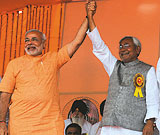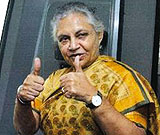|
Alliance embarrassment: Nitish vs Narendra
 It’s blown hot and cold in the month of June between the ruling JD (U) in Bihar and its chief alliance partner, the BJP. The reason lies in Bihar chief minister Nitish Kumar’s determination in keeping his Gujarat counterpart Narendra Modi far away from him, and his state. Kumar has a state assembly election to contest later this year, and believes that his party’s credentials will be destroyed, and minority votes lost, if Modi were seen close to him. Kumar had asked the BJP not to allow Modi to campaign in Bihar during the Lok Sabha (Federal) elections in 2009. Modi is still not in the clear following what appeared to be a state-orchestrated riot against minorities in 2002, soon after a train was attacked. It’s blown hot and cold in the month of June between the ruling JD (U) in Bihar and its chief alliance partner, the BJP. The reason lies in Bihar chief minister Nitish Kumar’s determination in keeping his Gujarat counterpart Narendra Modi far away from him, and his state. Kumar has a state assembly election to contest later this year, and believes that his party’s credentials will be destroyed, and minority votes lost, if Modi were seen close to him. Kumar had asked the BJP not to allow Modi to campaign in Bihar during the Lok Sabha (Federal) elections in 2009. Modi is still not in the clear following what appeared to be a state-orchestrated riot against minorities in 2002, soon after a train was attacked.
In some strange way the two states—Gujarat and Bihar—are among the fastest developing states in the country. Gujarat, of course, has stayed the course for quite a while, Bihar under Kumar is just showing signs of recovering and developing after the forgettable and scam-tainted Laloo Prasad era.
Somewhat unexpectedly, Kumar decided to return Rs 5 crore (USD 1.1 million) that Gujarat had given Bihar in 2008, soon after the Kosi river flooded and caused widespread damage. The funds remained unspent. When Modi talked about the donation to Bihar, and even advertised it, Kumar saw red. “This is uncivilized and against Indian culture. You don’t favour people afflicted by floods and then broadcast it to the world…” He then called off a dinner with BJP leaders.
The BJP’s general secretary in Bihar, Giriraj Singh, hit right back, saying it was crass on Kumar’s part to return the money. He pointed out that Gujarat accepted Bihar’s contribution after an earthquake in 2001 in all humility. “Returning the money is against constitutional prestige, and is uncivilized,” he countered. As of now, there is an uneasy truce. Looks like for the assembly elections, the alliance will last.
Delhi game for Olympics
 The countdown to India’s biggest sporting show—the Commonwealth Games in October, 2010—has begun. This makes Delhi’s Chief Minister Sheila Dikshit both edgy and excited. But having spearheaded the preparations for the Games and overseen the works of several departments in constructing stadia to greening and beautifying the city, she now feels that Delhi is ready to host the Olympic Games at some point. At a conclave hosted by newspaper Hindustan Times, she said, “We have good infrastructure and facilities now. We can definitely organize the Olympics.” She said that she had seen the level of planning that went into the Games preparations, noting that “all stake holders, including the municipalities, the IOA and the police had done their bit.” The countdown to India’s biggest sporting show—the Commonwealth Games in October, 2010—has begun. This makes Delhi’s Chief Minister Sheila Dikshit both edgy and excited. But having spearheaded the preparations for the Games and overseen the works of several departments in constructing stadia to greening and beautifying the city, she now feels that Delhi is ready to host the Olympic Games at some point. At a conclave hosted by newspaper Hindustan Times, she said, “We have good infrastructure and facilities now. We can definitely organize the Olympics.” She said that she had seen the level of planning that went into the Games preparations, noting that “all stake holders, including the municipalities, the IOA and the police had done their bit.”
Her Government introduced the unique Bhagidari concept in the late 1990s. It became a way of bonding between the people and the Government through combined initiatives. Now the CM would like the people of Delhi to take pride in the city, and look after it, and set an example of how good it can be before the rest of the world. She cited the example of the Delhi Metro, where the stations are clean, and people desist from throwing things around—otherwise a common ailment in the city.
If the Games go well, surely much of the credit would go Sheila Dikshit and her team. Already a popular chief minister, it would catapult her image even further. No one knows this better than the CM herself.
|